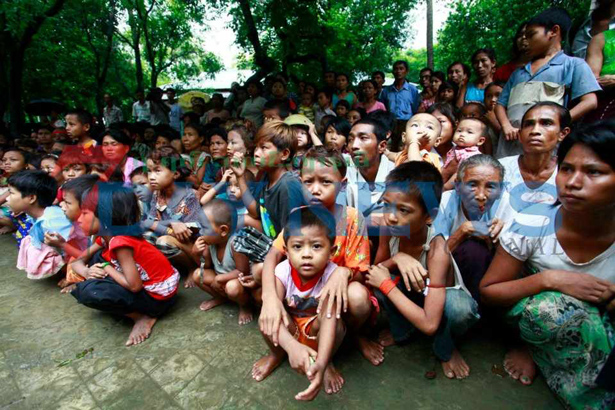Many local Arakanese ethnic nationalities in Buthidaung and Maungdaw Townships in northern Arakan State say they do not want foreign NGOs, including the organizations of the United Nations, re-opening in their areas.
 Residents contacted Narinjara by phone and in writing to say that international NGOs, including the UN, discriminate against the local ethnic residents in their operations and that some officials from those organizations were involved in stirring up the recent violent unrest in their area.
Residents contacted Narinjara by phone and in writing to say that international NGOs, including the UN, discriminate against the local ethnic residents in their operations and that some officials from those organizations were involved in stirring up the recent violent unrest in their area.
“Some employees of the NGOs were arrested by the authorities because they were involved in agitating the recent violent unrest. They downloaded the online news and photos and distributed them with their fabrications to the Muslims here to instigate them to rioting. Thus such unrest occurred in our areas,” said one resident from Maungdaw.
He said those NGO employees are also suspected by authorities for connections with illegal organizations in the neighboring country as well.
The residents said the UN and international NGOs usually charge the Burmese government for its human rights abuses and discriminatory practices towards the people, but they themselves are practicing widespread discrimination against the ethnic people in their areas as well.
“If we have to say…, whenever the UN and foreign NGOs call for job applications, they never employ the Arakanese ethnics despite their application and better qualifications. They employ only the Muslims in their projects. Moreover, they never give assistance to Arakanese even though they have nothing to eat, but they are providing all kind of assistance, including food, to the Muslim community. They always marginalize the Arakanese who are living side by side with Muslims in one village for their assistance. They are practicing such discrimination against the Arakanese people,” another resident told Narinjara over the phone.
Besides their discrimination, the local Muslim officers appointed by those organizations are also said to have often perpetuated the behavior such as insults, haughtiness, disrespect, and unsocial treatment towards the ethnic residents, using the facilities of those organizations.
Such misbehavior intensified dissatisfaction among the ethnic residents and caused mounting racial tension in the region, said a local social volunteer.
“Arakanese ethnic people are also severely suffering from oppression by the ruling people. In that situation, they are also being discriminated against by the international NGOs and they presume they have to face such discrimination just because of Muslims. So, they have turned their anger and dissatisfaction toward the local Muslim community. I have analyzed that the NGOs’ one-sided operation without doing thorough study on the long-standing problems have contributed to the development of racial hatred and animosity in our region,” he added.
He also said that NGOs have totally neglected one group of people while giving special favors to another group in their operations, causing misunderstanding, disharmony, and greater conflict between the two different groups in the region.
The residents said even the NGOs working for medical aid have given their attention and assistance only to the Muslim people, discriminating greatly against the local ethnic people as well.
Worried about security during the recent violence in Arakan State, the foreign NGOs reportedly suspended their operations in the area and called their staff back to Rangoon.
It was learned that the NGOs have now started to re-field their staff to help victims displaced by the unrest in Arakan State, but most of the ethnic residents in the region say they have no expectation for receiving their assistance and do not want their presence in the region.
The abbot of the Aloedawpyiy Monastery in Maungdaw reportedly told the officials of the Burmese government and international NGOs when they came to provide relief aid to the refugees taking shelter in his monastery that no foreign aid would be accepted.
One resident said such opposition to foreign aid reflects how much bitterness the local ethnic residents are feeling about the foreign NGOs.
Many believe that the foreign NGOs, including the UN’s organizations, will have to face the resentment and dissatisfaction of the local ethnic residents if they do not change their policies and continue their discrimination.



